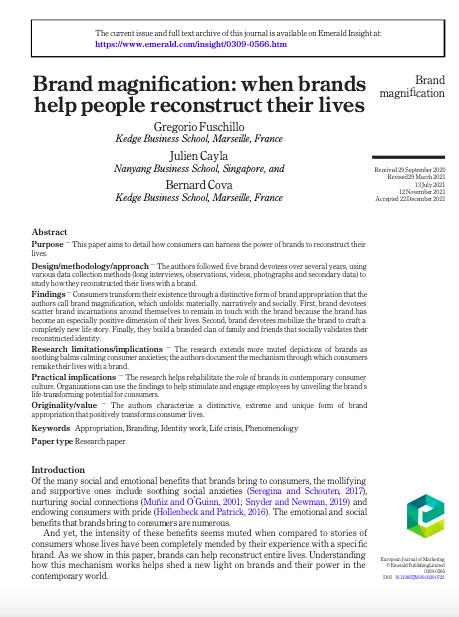Branding

Fuschillo, Gregorio & Cayla, Julien & Cova, Bernard. (2022). Brand magnification: when brands help people reconstruct their lives. European Journal of Marketing, 56 (3), 768–798.
Abstract: Purpose This paper aims to detail how consumers can harness the power of brands to reconstruct their lives. Design/methodology/approach The authors followed five brand devotees over several years, using various data collection methods (long interviews, observations, videos, photographs and secondary data) to study how they reconstructed their lives with a brand. Findings Consumers transform their existence through a distinctive form of brand appropriation that the authors call brand magnification, which unfolds: materially, narratively and socially. First, brand devotees scatter brand incarnations around themselves to remain in touch with the brand because the brand has become an especially positive dimension of their lives. Second, brand devotees mobilize the brand to craft a completely new life story. Finally, they build a branded clan of family and friends that socially validates their reconstructed identity. Research limitations/implications The research extends more muted depictions of brands as soothing balms calming consumer anxieties; the authors document the mechanism through which consumers remake their lives with a brand. Practical implications The research helps rehabilitate the role of brands in contemporary consumer culture. Organizations can use the findings to help stimulate and engage employees by unveiling the brand’s life-transforming potential for consumers. Originality/value The authors characterize a distinctive, extreme and unique form of brand appropriation that positively transforms consumer lives.

Cayla, Julien and Eckardt, Giana (2008), “Asian Brands and the Shaping of a Transnational Imagined Community,” Journal of Consumer Research, vol. 35 (August), 216–230.
Abstract We investigate how brand managers create regional Asian brands and show how some of them are attempting to forge new webs of interconnectedness through the construction of a transnational, imagined Asian world. Some branding managers are creating regional brands that emphasize the common experience of globalization, evoke a generic, hyper-urban, and multicultural experience, and are infused with diverse cultural referents. These types of regional Asian brands contribute to the creation of an imagined Asia as urban, modern, and multicultural. Understanding this process helps one to appreciate the role of branding managers in constructing markets and places.

Cayla, Julien (2013), “Brand Mascots as Organisational Totems,” Journal of Marketing Management, vol. 29 (1–2), 86–104.
Abstract: Drawing from ethnographic fieldwork in an Indian advertising agency, this paper demonstrates that brand mascots are more than advertising glitter designed to cajole consumers. When they become the basis for the collective rallying of organisational members who converge around a tangible manifestation of their firm's unique character, brand mascots operate as organisational totems, helping concretise and reproduce an organisation's identity in a foreign context.

Cayla, Julien and Eric Arnould (2008), “A Cultural Approach to Branding in the Global Marketplace,” Journal of International Marketing, Special Issue on International Branding, 16 (4), 86–112.
Abstract International marketing’s commitment to a technical and universalizing approach to solving managerial problems has meant that researchers have adopted an ethnocentric approach to branding. This is becoming problematic as the global marketplace develops. The authors argue that to meet the theoretical and methodological challenges of global branding, international marketing scholars will need to revise some key premises and foundations. Branding research in the future will need to be contextually and historically grounded, polycentric in orientation, and acutely attuned to the symbolic significance of brands of all types. The authors offer some conceptual foundations for a culturally relative, contextually sensitive approach to international branding in which the construct of brand mythology is central.



